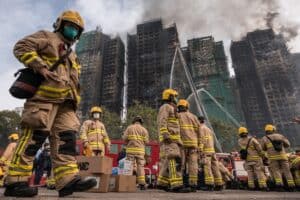In one incident, a group of outnumbered officers were surrounded in Yau Ma Tei district, forcing one to fire a warning shot, a police source said.

Thousands of Hong Kongers held vigils on Friday night for a student who died from a fall during recent protester clashes with police, triggering fresh outrage from the pro-democracy movement and renewed violence.
Although the precise chain of events leading to 22-year-old Alex Chow’s fall last weekend is unclear and disputed, his death on Friday morning was the first student fatality during five months of demonstrations.
Protesters have made alleged police brutality one of their movement’s rallying cries and have seized on the death.
At the spot where Chow fell, thousands queued for hours in snaking lines to lay flowers, light candles and write condolence messages.
Activists also blocked roads and trashed subway station entrances, sparking cat and mouse confrontations with the police in multiple neighbourhoods.
In one incident, a group of outnumbered officers were surrounded in Yau Ma Tei district, forcing one to fire a warning shot, a police source told AFP.
The death sent tensions soaring once more in a city reeling from five months of political chaos.
“Today we mourn the loss of a freedom fighter in Hong Kong,” Joshua Wong, a prominent pro-democracy campaigner, said on Twitter.
“The atmosphere in Hong Kong is like a ticking bomb,” added Lo Kin-hei, a local pro-democracy councillor and activist. “HKers don’t trust the police will give us the truth.”
Police have repeatedly denied any allegations of wrongdoing in relation to Chow’s death.
The lead officer in the case, Superintendent Ewing Wu, again insisted on Friday that police were not at fault.
“As for the allegations that police chased the deceased or that we pushed him and caused him to fall, the police hereby make a solemn statement again that nothing of the kind happened,” Wu told reporters.
Chow was taken to hospital early on Monday morning following clashes between police and protesters in the middle-class district of Tseung Kwan O. He died on Friday morning after failing to emerge from a coma.
He had been found lying unconscious in a pool of blood inside a multi-storey car park that police had fired tear gas towards.
Protesters had been hurling objects from the building, in the type of confrontation that has become routine.
The car park has become a makeshift memorial with mourners laying down a growing sea of white flowers, sticky-note messages and paper cranes.
“I think there should be an independent inquiry commission to investigate his death and other incidents happened during the movement,” a 23-year-old student, who gave her surname Ho and said she attended Chow’s university, told AFP.
Police have acknowledged that tear gas had been used on Sunday night to disperse protesters near the car park where Chow fell.
Wu, the lead investigator, confirmed on Friday that police entered the car park twice to contain the protesters but said that officers were not inside when Chow fell four metres between two storeys.
Wu and a police spokeswoman also rejected accusations that officers delayed paramedics getting to the scene.
“At this stage, we are investigating the cause of Chow’s death instead of investigating police officers,” Wu said.
In Beijing, foreign affairs ministry Geng Shuang declined to comment directly when asked about Chow’s death but said “eliminating disorder” was Hong Kong’s most urgent task.
Chow was a student at Hong Kong University of Science and Technology.
The university held its graduation ceremony on Friday morning, and its head Wei Shyy paused the proceedings to announce Chow’s death.
After the ceremony was cut short, hundreds of students gathered to mourn Chow’s passing and condemn what they described as police brutality.
Some went on to vandalise facilities, including the outside of Shyy’s residence.
Shyy later released a statement to students backing calls for an independent inquiry.
“We will be outraged if there is no acceptable explanation offered to us,” he wrote.
Millions of people have taken to Hong Kong’s streets since June in the greatest challenge to China’s rule of the city since its handover from the British in 1997.
China governs Hong Kong under a special “one country, two systems” framework that is meant to give the city more freedoms and liberties than on the mainland.
But public anger has been building for years over a belief that Beijing is eroding those freedoms, especially since President Xi Jinping came to power.
The protests were triggered by a government effort to introduce a law allowing extraditions of criminal suspects to mainland China.
Hong Kong’s government belatedly withdrew the plan but not before the protest movement escalated into wider calls for democracy.
Protesters are demanding fully free elections to choose the city’s leader, as well as an investigation into alleged abuses by police.
For more news your way, download The Citizen’s app for iOS and Android.






